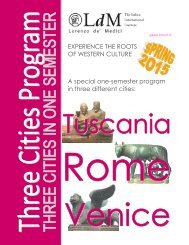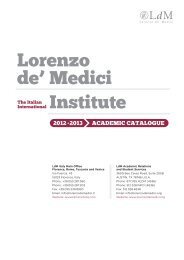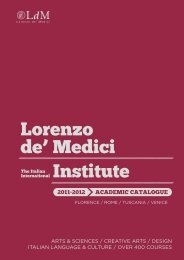aCademiC Catalog 2013-2014 - Lorenzo de Medici
aCademiC Catalog 2013-2014 - Lorenzo de Medici
aCademiC Catalog 2013-2014 - Lorenzo de Medici
Create successful ePaper yourself
Turn your PDF publications into a flip-book with our unique Google optimized e-Paper software.
FLORENCE<br />
School of Arts & Sciences<br />
Peace Studies<br />
Anthropology of Violence and Conflict<br />
PST 190 F; Dual listed: ANT 190 F<br />
Cr: 3; Contact hrs: 45<br />
This course explores the dynamics of conflict in social relations<br />
and investigates the circumstances un<strong>de</strong>r which violence,<br />
in its different aspects, may arise, on the un<strong>de</strong>rstanding that<br />
while conflict can no doubt play a positive role in social life, by<br />
no means the same can be said of violence. The first part of<br />
the course will <strong>de</strong>al with conflict and violence at the “micro”<br />
level - that is with conflict and, occasionally, violence among<br />
individuals in everyday social relations - and specifically with<br />
the role played by the pragmatic dimension in conflictual<br />
interactions. The second part of the course will <strong>de</strong>al with conflict<br />
at the “macro” level - that is conflict between large groups -<br />
focusing especially on the investigation of the circumstances<br />
un<strong>de</strong>r which conflict is likely to erupt into macro-scale violence.<br />
In this light, the concept of ethnic i<strong>de</strong>ntity shall be analyzed,<br />
and the notion of ethnic conflict – with examples from Africa,<br />
Asia, and the Balkans, illustrated with the aid of documentary<br />
films – will be put un<strong>de</strong>r scrutiny.<br />
Anthropology and Development<br />
PST 200 F; Dual listed: ANT 200 F<br />
Cr: 3; Contact hrs: 45<br />
The course provi<strong>de</strong>s an up-to-date and in-<strong>de</strong>pth un<strong>de</strong>rstanding<br />
of anthropological perspectives on policy and practice in<br />
contemporary international <strong>de</strong>velopment aid, and gives a<br />
theoretical overview of the relationship between <strong>de</strong>velopment<br />
aid and anthropology. Stu<strong>de</strong>nts explore the contribution of<br />
anthropology to contemporary <strong>de</strong>velopment aid <strong>de</strong>bates, on<br />
poverty, human rights, violence and complex emergencies, and<br />
the “market” as a core metaphor of globalized <strong>de</strong>velopment.<br />
The politics of humanitarian aid, shifting aid frameworks, and<br />
concrete intervention programs in <strong>de</strong>veloping countries will<br />
be examined, bridging the disparate worlds of planners of<br />
international agencies and beneficiaries of poor countries.<br />
Concepts and <strong>de</strong>bates are then probed further through<br />
examination of real study cases of <strong>de</strong>velopment projects in<br />
Africa and South America, with the contribution of international<br />
consultants working in the sector of humanitarian aid and<br />
<strong>de</strong>velopment cooperation. Simulations of “participatory<br />
methods” will be also inclu<strong>de</strong>d as a manner of exploring the<br />
meaning of the key concepts of community <strong>de</strong>velopment,<br />
popular “participation” and “empowerment.”<br />
Participation, Empowerment and Social<br />
Change<br />
PST 280 F<br />
Cr: 3; Contact hrs: 45<br />
The course offers a general introduction to the basic concepts<br />
of empowerment and public participation of citizens in the<br />
<strong>de</strong>finition of public policies. The two concepts are closely<br />
related to each other: In this context, the term “empowerment“<br />
means reinforcing citizens’ and groups ability to raise concerns<br />
and wage conflicts constructively, to become aware of their own<br />
strengths and their voice in collective negotiation and <strong>de</strong>cisionmaking<br />
processes. The course will present the main theories,<br />
mo<strong>de</strong>ls and practical examples related to public participation<br />
and empowerment processes. The relationship between<br />
public participation and empowerment processes with conflict<br />
resolution will be explored.Several techniques and practical<br />
tools for fostering empowerment processes and participative<br />
<strong>de</strong>mocracy, such as communication skills, conflict analysis<br />
and transformation, facilitation and Open Space Technology,<br />
will be illustrated. Most recent <strong>de</strong>velopments of web-based<br />
participation (use of social networks, flash mobs, and the like)<br />
will also be discussed. During the course, stu<strong>de</strong>nts will have the<br />
opportunity of practising the tools and techniques presented<br />
in practical exercises and role plays. Cinema and vi<strong>de</strong>o material<br />
will also be used in the training.<br />
International Conflict Resolution<br />
PST 290 F; Dual listed: POL 292 F<br />
Cr: 3; Contact hrs: 45<br />
The course presents concepts and theories related to the<br />
peaceful transformation of international violent conflicts,<br />
illustrating them with examples driven both from global peace<br />
initiatives and Italian experiences in the field. Approaches to<br />
International Conflict Resolution have become wi<strong>de</strong>ly used and<br />
discussed in the last <strong>de</strong>ca<strong>de</strong>. New roles and tasks have emerged<br />
for international organizations such as the United Nations and<br />
the OSCE. At the same time, civil society organizations have<br />
increasingly played an important role in conflict resolution,<br />
through “second-track” or citizens’ diplomacy, conflict sensitive<br />
approaches to <strong>de</strong>velopment, as well as third party nonviolent<br />
intervention. In Italy, several peace organizations have their<br />
roots in Christian Catholic values. The strong tradition of selfgovernment<br />
has also encouraged Municipalities and Regions to<br />
work on <strong>de</strong>velopment and peace issues. At the end of the course<br />
participants will have a clear un<strong>de</strong>rstanding of international<br />
conflict resolution and will have gained an insight into concrete<br />
examples both of global and Italian organizations.<br />
War and Media<br />
PST 301 F; Dual listed: POL 301 F / COM 301 F<br />
Cr: 3; Contact hrs: 45<br />
This course analyses the role played by the media in the<br />
evolution of national and international wars. We will investigate<br />
the extent to which the media either influence <strong>de</strong>cision-making<br />
about military interventions or serve as tools in the hands of<br />
government officials seeking to influence public opinion. A<br />
number of media-related phenomena will be studied including<br />
the CNN effect, agenda setting, real time policy, media diplomacy,<br />
media war, news management and propaganda, through the<br />
examination of key international conflicts, especially since<br />
1950. Several different topics will be explained to un<strong>de</strong>rstand<br />
the intersection between war and media: the proliferation of<br />
satellite technologies and the internet; the importance of<br />
the international TV networks (like CNN and al Jazeera); the<br />
role of still and moving images; the importance of journalists<br />
and journalistic routines; the relevance of press conferences,<br />
briefings, and official statements; the representation of war<br />
in movies and artists’ works; the media gap between “North”<br />
and “South”; the emergence of “non-Western” media; and also<br />
the spread of ethnic conflicts and terrorism, and the more and<br />
more asymmetric nature of war.<br />
Prerequisites: COM 180 Mass Communication, or HIS 130<br />
Western Civilization, or POL 150 Introduction to Political<br />
Science, or equivalents<br />
Peace Education<br />
PST 302 F<br />
Cr: 3; Contact hrs: 45<br />
This course moves from the <strong>de</strong>scription of crucial personalities<br />
to the <strong>de</strong>velopment of an educational framework for peace.<br />
Stu<strong>de</strong>nts will investigate some historical cases such as the<br />
inspiring i<strong>de</strong>as and practical experiences of Gandhi in India and<br />
Maria Montessori in Italy, who foun<strong>de</strong>d houses for children at<br />
the beginning of the last century. Stu<strong>de</strong>nts will also explore the<br />
experiments of Danilo Dolci and his collaborators in Sicily, and<br />
the achievements of <strong>Lorenzo</strong> Milani in Tuscany. We will explore<br />
possible resonances between these activities and those of<br />
young Americans in the 1960s, who moved to the southern US<br />
and foun<strong>de</strong>d popular schools as part of the struggle against<br />
racial segregation. Arriving at the present, we will give examples<br />
of the reciprocal maieutical method applied to adolescents in<br />
schools by using the autobiographical approach. What kind of<br />
needs do they express? What kind of i<strong>de</strong>als? What do peace,<br />
intercultural relations and social participation mean in their<br />
daily lives?<br />
Prerequisites: Junior standing<br />
Peacekeeping<br />
PST 360 F; Dual listed: POL 360 F<br />
Cr: 3; Contact hrs: 45<br />
The course focuses on a critical issue in international politics<br />
and global security today: local conflicts around the world.<br />
The course is divi<strong>de</strong>d into three parts, addressing intra-state<br />
conflict, external response, and the politics and strategies<br />
of implementation. The first part applies the theoretical<br />
framework of conflict analysis to recent examples. Special<br />
consi<strong>de</strong>ration is given to un<strong>de</strong>rlying geo-political, economic<br />
and religious divi<strong>de</strong>s. The second part starts with the basic<br />
74<br />
LdM Aca<strong>de</strong>mic <strong>Catalog</strong> <strong>2013</strong>-<strong>2014</strong>





